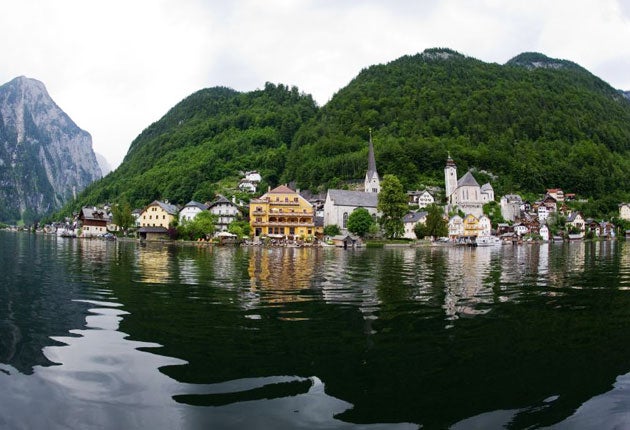Alpine villagers bewildered as China clones their home

Your support helps us to tell the story
From reproductive rights to climate change to Big Tech, The Independent is on the ground when the story is developing. Whether it's investigating the financials of Elon Musk's pro-Trump PAC or producing our latest documentary, 'The A Word', which shines a light on the American women fighting for reproductive rights, we know how important it is to parse out the facts from the messaging.
At such a critical moment in US history, we need reporters on the ground. Your donation allows us to keep sending journalists to speak to both sides of the story.
The Independent is trusted by Americans across the entire political spectrum. And unlike many other quality news outlets, we choose not to lock Americans out of our reporting and analysis with paywalls. We believe quality journalism should be available to everyone, paid for by those who can afford it.
Your support makes all the difference.The idyllic Austrian village of Hallstatt boasts fine traditional wooden chalets, ancient churches and breathtaking panoramic views over its own lake and the surrounding snow-capped Alps: "Many describe it as the most beautiful lakeside village in the world," insists the local tourist board.
Nobody, it seems, would agree more with this assessment than the Chinese. And it has emerged that a development corporation in the distant southern province of Guangdong is busy building a carbon copy of Hallstatt, which it has started advertising as a "low density, high-end residential development with mountain and lake views".
The news has come as a shock to Hallstatt's 800 residents. The beauty of their village may have earned it Unesco World Heritage site status, but nobody in the picturesque tourist magnet in the heart of Austria's Salzkammergut had any idea the Chinese planned such a project, let alone that they would go ahead and build it.
"The people are not very amused that this has happened behind their backs," is how Hallstatt's mayor Alexander Scheutz put it. "But I found myself confronted with a fait accompli. I am stunned," he admitted. Mr Scheutz said he had complained to Unesco about the Guangdong project.
The Hallstatters have concluded that a team of Chinese "spies" must have mingled among the estimated 800,000 tourists who visit the village each year. They are believed to have taken hundreds of photographs for use as the basis for the housing scheme in the town of Huizhou, north of Hong Kong.
Monika Wenger, the proprietor of a 400-year-old inn in Hallstatt said most villagers she had talked to were "outraged – not about the fact but the approach" taken by the Chinese. "I don't like the idea a team was here for years measuring, photographing and studying us," she said, "I would have expected them to approach us directly – the whole thing reminds me of Big Brother."
Mrs Wenger found out about the Huizhou project only earlier this month. A Chinese woman staying at her hotel allowed her to look at drawings she had of Hallstatt's market and other key landmarks which, she revealed, were due to be faithfully reproduced in China.
The Austrian authorities are still deciding how best to respond to the Chinese plans. The Unesco-affiliated monument conservation office, which looks after the village, said that while copying structures on the basis of photographs was legal, owners had to grant permission for their buildings to be measured. "The legal situation still needs to be examined," said spokesman Hans-Jörg Kaiser. Yet some of Hallstatt's residents admit they welcome the project because it gives the town publicity, which will attract more Chinese tourists. "We are happy they find it beautiful enough to copy," said Ingrid Janu, who runs a souvenir stall.
In China, however, the cloning of European towns and villages is not only highly popular but big business. The city of Chengdu is proud of its "British Town" completed in 2005, which is modelled on Dorchester.
Crystal He, a spokeswoman for the Chinese Minmetals Corporation, which is building the Hallstatt copy, told the Associated Press the five-acre village would include a shop selling Austrian souvenirs. "Homesick Caucasian people from Hong Kong will like it as well," she insisted.
Subscribe to Independent Premium to bookmark this article
Want to bookmark your favourite articles and stories to read or reference later? Start your Independent Premium subscription today.
Join our commenting forum
Join thought-provoking conversations, follow other Independent readers and see their replies
Comments